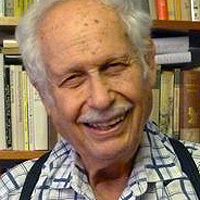
BERLIN – It’s hard to decide: which article on Germany’s new president, East Germany’s (the former German Democratic Republic’s) pastor Joachim Gauck, was more misleading – the one in the New York Times, or in its European subsidiary, The International Herald-Tribune.
The latter, under the headline “A leader in touch with his people,” described stirringly “his integrity and moral leadership,” called him (and the country’s Chancellor Angela Merkel) “former victims of Communist oppression,” and recalled that “three of his four children fled to West Germany.”
The New York Times, in a similar vein, told how, when gaining fame as head of the state archive on the East German State Security Office (Stasi – the national security organization of the former German Democratic Republic), “instead of using his position to wreak vengeance, he ran his organization with such fairness that it was informally named for him: the Gauck Authority.” It also discovered that he had “long given voice to the concerns of ordinary people.”
All of this is total nonsense; the work of spin-doctors and of his own rhetoric, very effective unless you are allergic to ham-acting and monotonous repetition of one theme.
His unceasing subject is his bitter condemnation not only of communism, but also of anything leaning leftward. It was inherited from his parents, both enthusiastic Nazis, and understandably magnified when his father, in 1951, was imprisoned for five years by the Soviets.
The attacks on Communists, garnished with emotional praise of newly won freedom and democracy in every second or third sentence, plus adulation for him in the mass media, won him the approval of all major parties in Germany, except the Left. The right-wing government parties are not alone in supporting him, and were late in doing so. Surprisingly, it was the traditionally left-of-center opposition parties, the Social Democrats and the Greens, which initiated and continued his relentless drive for the presidency, even after losing a first attempt two years ago. This agreement among all four made the very expensive election procedure a virtual farce. The only opposition came from the Left Party, whose candidate was hopelessly outnumbered. Gauck received 991 votes of the special Election Parliament, the Left candidate got 126, while 16 voted for minor candidates and 108 abstained.
What about the hype for Reverend Gauck? He was never a “courageous freedom fighter” in those bad old East German years, and never a victim. Indeed, though a bitter anti-Communist, he believed in getting along, and was treated more than favorably. He even met State Security officers (the “Stasi” he later attacked so mercilessly) and, while evidently keeping his meetings secret from his church superiors, won rare privileges: his three sons did not “flee” to the West as reported but were officially permitted to move there with their possessions and to return for visits when they pleased.
When socialism collapsed in the German Democratic Republic in 1990, the Federal Republic of Germany, the West German capitalist state, essentially annexed the entire country.
Gauck discovered his crusading spirit only when it became perfectly clear that the German Democratic Republic was doomed.
He acquired a reputation not of fairness but as vengeful destroyer of thousands of careers and lives. Of course Stasi nastiness was exposed, but so were very many guilty only of inevitable contacts with the authorities, including the Stasi. Like Nero in old Rome, his thumb, raised or lowered, decided many people’s fate, sometimes their lives. Though praised by active dissidents, he was feared by many and despised by far more, including academicians from all.
For countless East Germans, Gauck’s name inspired feelings like those inspired in the U.S. by J. Edgar Hoover or Joseph McCarthy. Sixty percent opposed him in a recent poll in his hometown of Rostock, and in a radio poll in a large part of East Germany, the disapproval rate had reached 80 percent when it was called off “because of technical problems!”
But after ten years, Gauck passed his job as modern Nero to successors. What about his own political views? He is not only a flowery, eloquent speaker, but a careful one, and usually speaks in terms vague enough to prevent clear conclusions. Few if any are presented in the two articles. But certain views have become apparent.
He opposed Occupy Wall Street; like any demands for restrictions on banks or financiers, it was “absurd.” Freedom meant individual responsibility as opposed to a social state – more or less the same views as those of the Tea Party.
As for sending German troops and planes in Afghanistan, he said: “I find their deployment not good but acceptable and justified.”
He denounced the German-Polish border established in 1945 as Stalinist injustice, although it had been decided upon by all the major powers at the time. The claims to lost regions were official by all West German governments Willy Brandt recognized the borders in 1970 (20 years later than East Germany). Such claims are still a basic demand of extreme nationalists.
Gauck’s constant attacks on Communism are a key part of today’s media propaganda. Their purpose and effect are to minimize the horrors of Auschwitz by equating them to “Communist dictatorship,” and thus negate any dreams of a future socialist nation or world as “totalitarian.”
When Gauck signed the “Prague Declaration” on June 3, 2008, stressing substantial similarities “between Nazism and Communism because of their crimes against humanity,” it was the Jerusalem director of the Simon Wiesenthal Centers, Efraim Zuroff, who cautioned that “certain Eastern European circles like to see communist crimes condemned as sharply as the crimes of the Nazis.” By creating completely inappropriate parallels, this removes blame from the Germans.
The editor of the far-right magazine “Junge Freiheit” wrote: Gauck’s “plea for love of the fatherland and a will for freedom, this exemplary patriotism, can further the normalization of our country.”
The head of the extremist group ‘Die Freiheit’ said that Gauck’s election will “again provide tangible hope for our country.” They just love his brand of “new patriotism.”
They also like his views on immigrants. When the highly-touted book by the prominent Muslim-hater, Thilo Sarrazin, called Turks and Arabs less intelligent and a danger to the German nationality, Gauck carefully avoided open praise but said in easily understood code language that Sarrazin had “courage” to raise these issues – as if they had not been raised by hate-artists for the past thirty years!
So why in the world did the Social Democrats and Greens propose him, push him in 2010 and, in alliance with the viciously rightist, muslimophobic BILD newspaper help boot out Christian Wulff and open the door to Gauck?
It is truly hard to comprehend, but two reasons seem clear. First, they wanted to embarrass and weaken Angela Merkel and her Christian Democratic Party, to which the deposed Wulff belonged – but which was finally forced into approving Gauck. More decisive, it seems clear, was their attempt to split or weaken their main rival, the Left party. This party gained strength in 2009 because Greens and Social Democrats, when in the government, took sharply anti-social courses on many key issues, taxing the poor and middle classes, not the wealthy; delaying retirement age, charging more for medical expenses, and hitting the jobless.
After being forced into opposition they became socially conscious again, often commandeering the very demands of the Left they had opposed when in office. They have made gains with many forgetful voters but the threat of people moving leftwards is always present, especially in Eastern Germany where the Left is strongest. And with Gauck they have a symbol with which to label all rivals who oppose him as pro-GDR, pro-Stasi, pro-Stalinist.
But a few courageous observers, not only left-wingers, now warn that they may well have created a Frankenstein monster, a forceful, ambitious and eloquent force who is one of the most right-wing presidents since 1945. His position in very powerful but economically imperiled Germany opens up an almost frightening perspective.
One last note: In their last articles, neither the NYT nor the IHT even mentioned Beate Klarsfeld, the candidate of the Left. True, she was chanceless against all four other parties. But her record as a famous, active, life-long anti-Fascist did not merit the crude snub by both Social Democrats and Greens, who carefully avoided even a short meeting with her. She was largely ignored or primitively maligned in most of the press, falsely pictured as a friend of East Germany and the Stasi because they helped her a few times in hunting out Nazi war criminals. She is an elderly, not too strong person and had no chance, but she represented a true moral alternative. It would have been correct to treat her at least politely, for she, and she alone, offered a moral alternative to Gauck. But she received few votes aside from those of the Left party. One slim consolation: 108 delegates evidently held their noses and abstained.
One must hope that the Greens and the Social Democrats will not come to regret their so clever if unprincipled maneuver, and that Germany and all Europe may not suffer from it.
Photo: Joachim Gauck and partner Daniela Schadt attend Germany’s Federal Assembly in Berlin. Markus Schreiber/AP

MOST POPULAR TODAY

High Court essentially bans demonstrations, freedom of assembly in Deep South

Zionist organizations leading campaign to stop ceasefire resolutions in D.C. area

U.S. imperialism’s ‘ironclad’ support for Israel increases fascist danger at home


UN warns that Israel is still blocking humanitarian aid to Gaza






Comments